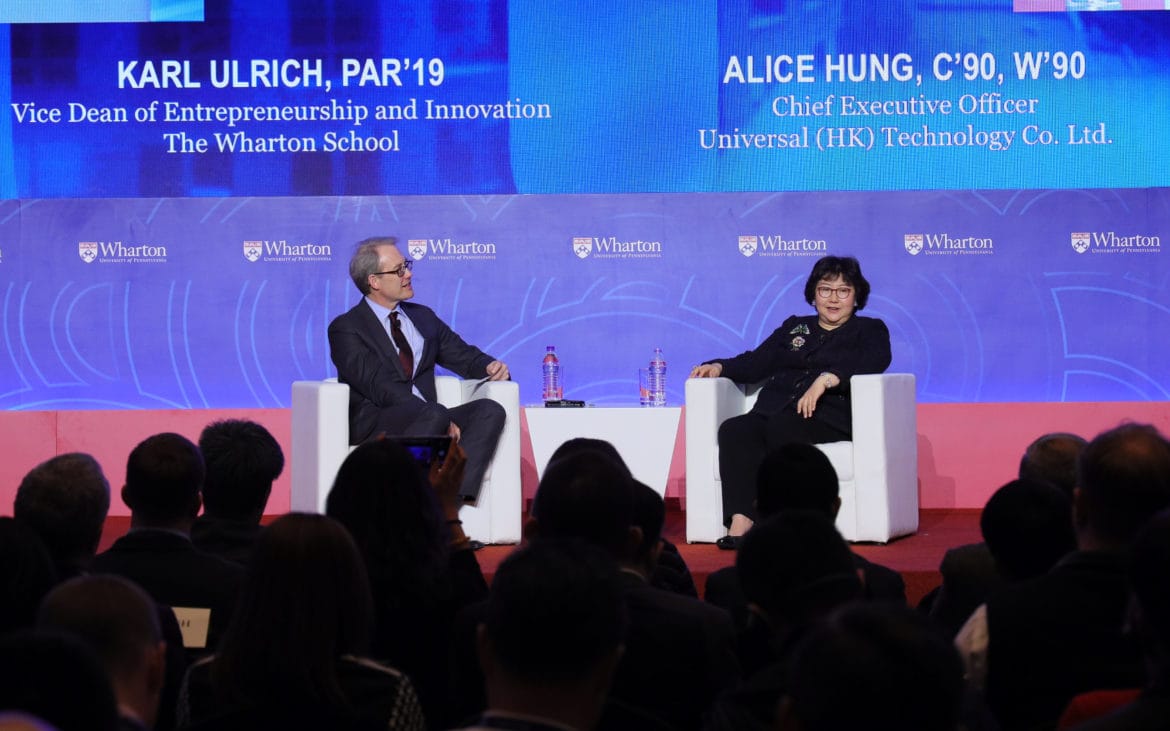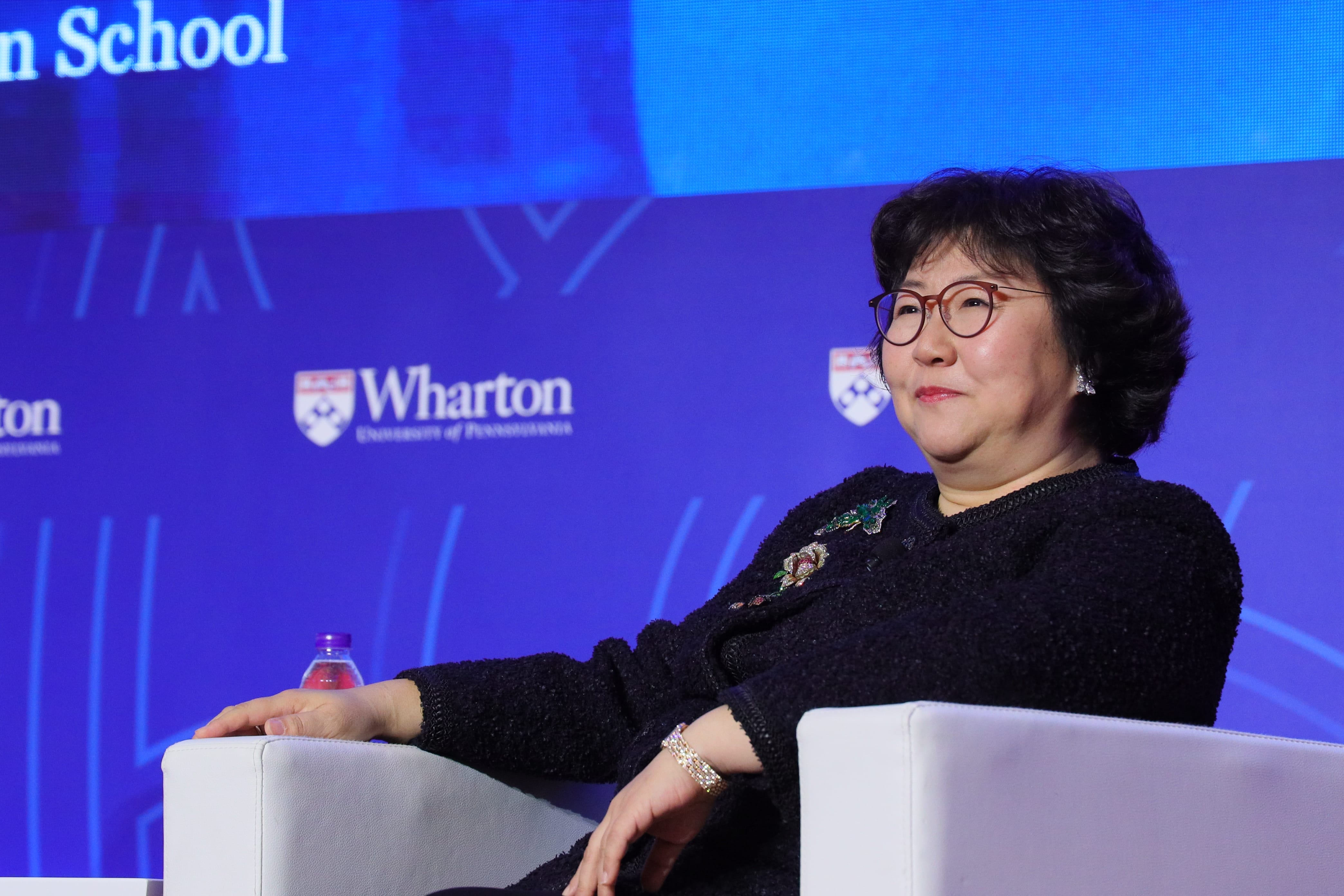“I’m not Steve Jobs,” said Alice Hung C90 W90, expressing her typical humility even while being honored with Penn Wharton Entrepreneurship’s 2019 China Entrepreneur Award at last month’s Wharton Global Forum in Shanghai. While it’s true that Hung wasn’t a founder of Apple, her life story and path to professional success could be a Walter Isaacson page-turner someday. Hung’s immigrant roots in Hong Kong and indefatigable work ethic led her to Penn and eventually to mainland China, where the failure of her first startup served as fuel for a vast portfolio of business ventures yet to come. The foundation of her success was in real estate; Hung spent nearly 20 years investing in Beijing and Hong Kong, then expanded her portfolio to include more than 100 properties across the globe. Today, Hung serves as founder and CEO of Universal (Hong Kong) Technology Co. Ltd., a leading sales and distribution company in Asia which provides equipment for drug discovery, nano material R&D, and petroleum-related products. Venture capital is a passion of hers, as well—Hung’s investments range from biotech to dental clinics and e-commerce to 5G data security.
After an introduction from Wharton Dean Geoff Garrett, Hung sat down for a fireside chat with Vice-Dean of Entrepreneurship and Innovation Karl Ulrich. Hung explained how, after less than a year as an analyst at Lehman Brothers, she saw the “fast train” of economic opportunity in China and moved there. With money she earned from selling an MRI machine, Hung started Honey Bee, a children’s clothing company. While Hung is still well-known for designing her own colorful fashions, she soon realized kids clothes were not her forte. Some might see defeat in that experience, but Hung moved forward in search of new opportunities. The lesson, as she explained to Ulrich: “Salespeople can sell things out of failures.”

Hung with Vice-Dean of Entrepreneurship and Innovation Karl Ulrich at the Shanghai Global Forum
Hung’s advice for valuating new ventures was that it’s the people as much as the product that you’re really investing in. (“People are what make things happen,” she said). The Hong Kong resident stressed the importance of family—husband Alex and their children, Catherine and Michael—and with her daughter in the audience on International Women’s Day, Ulrich asked what Hung hoped for her children and other young would-be businesspeople. “Entrepreneurial spirit is the greatest gift I can give,” Hung said. “The ability to take risks and enrich one’s own life.”
To offer more insight into her remarkable story, the following is a portion of a Wharton Magazine interview with Hung, in which she spoke about her brief advertising career at Penn, the importance of investing in people, and why happiness is a cold shower.
Wharton Magazine: I want to start by asking you about your business.
Alice Hung: I sell analytical and testing instruments to laboratories. I started this business and I’ve been doing it with the same people since 1991. It’s a very good business. You never come across anybody who sells analytical testing instrument like us. In our field, nobody went to Wharton. We’re different than everybody else so nobody can compete with us. You know the blue ocean strategy of INSEAD? You see the whole world and there’s not another boat around, nobody to compete with you. That’s wonderful.
WM: That’s a great position to be in. You’re also a real estate investor?
AH: Yes—I’ve been doing that since 1995. I have land and real estate investments in Hong Kong, Shanghai, Beijing, London, New York, Guangzhou, Chengdu, Hanoi, and Ho Chi Minh City. On some of my properties, the return is as high as 90 times the return on equity with mortgage.
WM: So tell me a little bit more about your background. What else sets you apart from the competition?
AH: I’m from an immigrant family. I moved to Hong Kong when I was five. My father was a physicist and my mother was a chemist.
WM: And when your family came here, you didn’t have a lot.
AH: No, nothing. We stayed in a small room like this and I slept on a bunk bed. My brother slept on the top, I slept with my grandmother on the bottom, and my parents took a straw mat and slept on the ground every night. My mother went into business when I was in grade seven. At that time my parents could not speak English. We saved every bit and I went to the U.S. for high school. I finished two degrees [at Penn] in three and a half years.
My mother was always very hard working and I learned that from her. At Penn, I actually made most of my pocket money by myself. I was working for The Daily Pennsylvanian—I sold advertisements for them. I think I got $600 a month on commission. I went to Chinatown and I sold advertisements for dining because nobody else from The Daily Pennsylvanian was selling there. When you have no money, you just need to find your own way. And I always find my own way because I have to.
WM: Talk about the importance of relationships in business. Would you say that’s part of your secret to success?
AH: I think in relationships it’s really not about money—it’s about how you treat people. You treat people sincerely and you’ll be like somebody’s relative. Be somebody’s sister and they’ll really go out of their way to help you.
When I was first in China, I had no money. But I’m a very friendly person, so I went to people’s homes to watch TV and have dinner with them. They cooked for me and they actually loved that because they love to offer you something. Don’t go to a restaurant. You’ll be a better friend if you go to their home and watch TV and eat what they can offer to you. Because it’s a very nice feeling to be able to offer, not only to take.
WM: Was there someone who was critical for your career, who helped you?
AH: No. Just everyone that I met. For example, there was one supplier, he was part of Halliburton at that time. He came over and I took him shopping, I took him everywhere. I did not have an office in 1993. He said, “Alice, you took me everywhere except for your office, but I’m sure whenever you’re going to bring me to your office, it’s going to be a nice huge office.” I think he understood. He was willing to give his hand to a 25-year-old girl because he thought that I tried so, so hard. That’s why I’m also very willing to give a hand to somebody who’s in that situation.
WM: Was there a pivotal moment in the growth of your business that you look back on and say, “That’s why I’m sitting here today”?
AH: I think the pivotal moment was when I went back to China in 1991 and nobody did. I was working with Lehman Brothers at that time. I told my mom I was going to go back to China to do business and my mom was like, “While I was there it was very hard for business and now you’re working for Lehman Brothers. Why would you want to go back?” China’s business was quite low at that time. Not like it is today. You have to imagine China 26 years ago. Even my boss at Lehman Brothers was like, “Alice, you’re quitting the job to go to China? To do what?” Well, to make money.
WM: That seems to be a common thread through the stories of people who’ve found success. There was a point in their career in which someone said they had a crazy idea, but they had the conviction to follow it and it paid off.
AH: Yes, because I think being an entrepreneur is all about personality. It’s about how tough you are, how much courage you have. And in everything I did in my whole life, I am who I am. I don’t care what other people say. Maybe it’s wrong, but you know what, let’s try. What’s the consequence? Yes, I might go back to that little room [where I grew up], but that little room was full of love. Because my parents really loved me, my brother really loved me, my grandmother really, loved me. That’s so important.
I’ll tell you a story about what is love. When we were living in that apartment, I got to take a shower maybe every three days in the winter because we did not have a hot water shower. We needed to boil water and to boil water we used a kerosene burner. I was always the last one to take that shower because my parents, my grandmother, my brother would all take showers before me. And that room was warm. It’s a lot of steam after everyone takes a shower. And that’s love.
WM: Take the last shower. That’s a really great lesson.
AH: Happiness is really not what you have but rather to be loved. And I think I was the happiest person every time I took that shower. I never really told anybody—I never told my parents, but I think I’m willing to do everything for my family because of that.

























